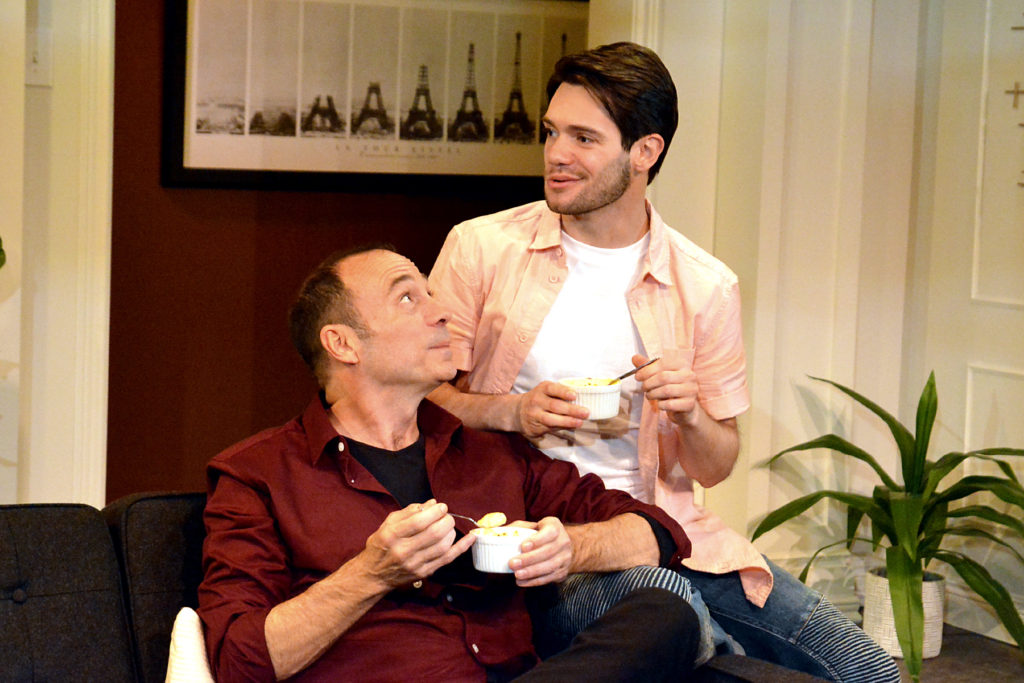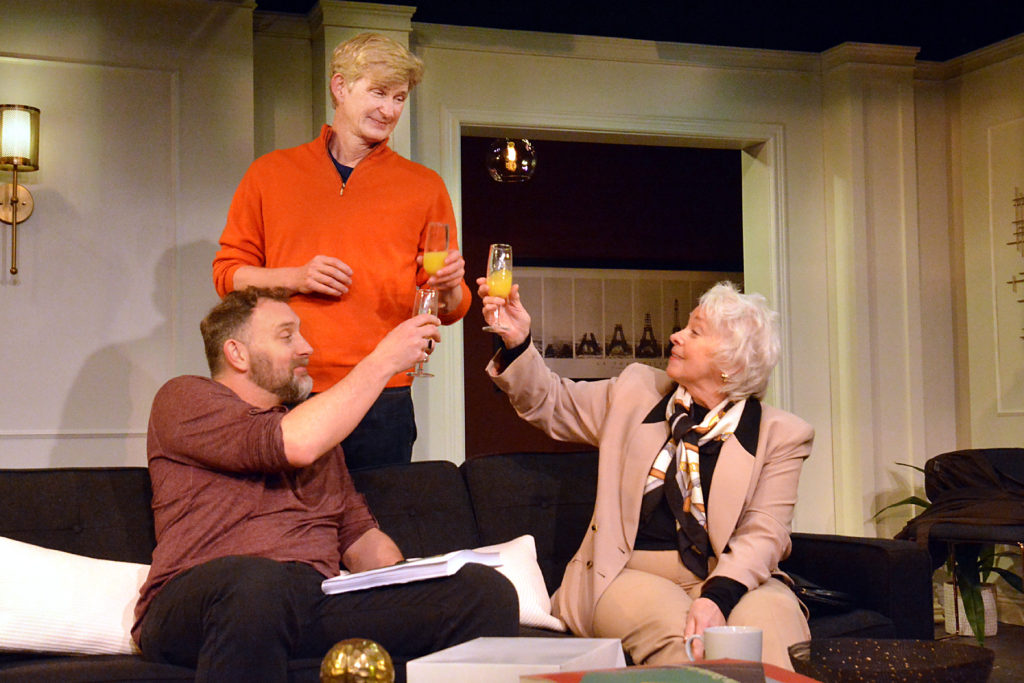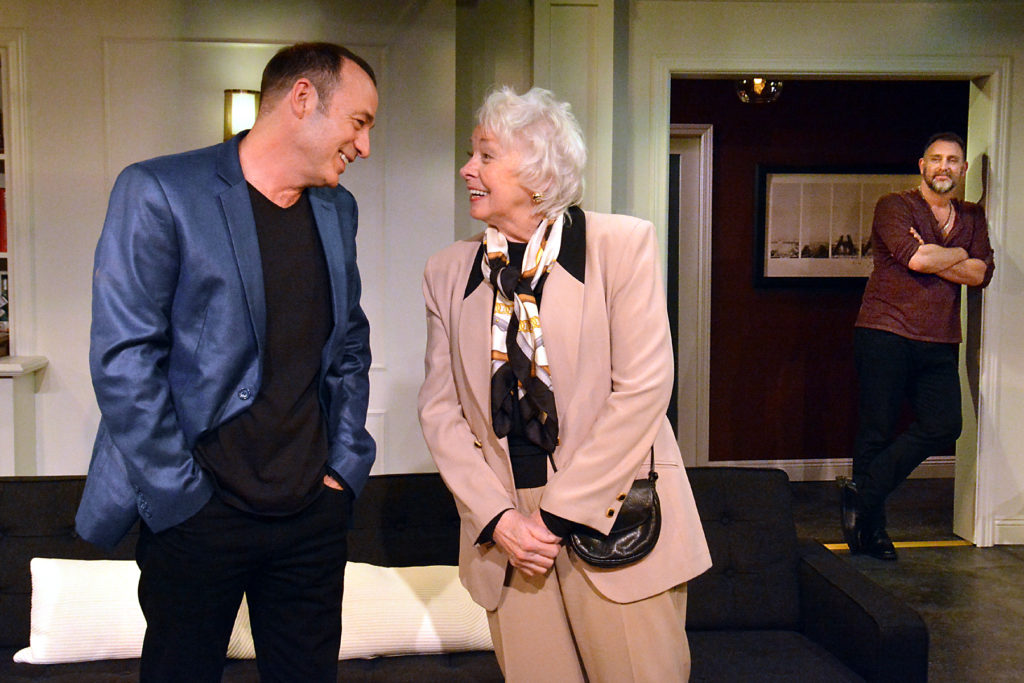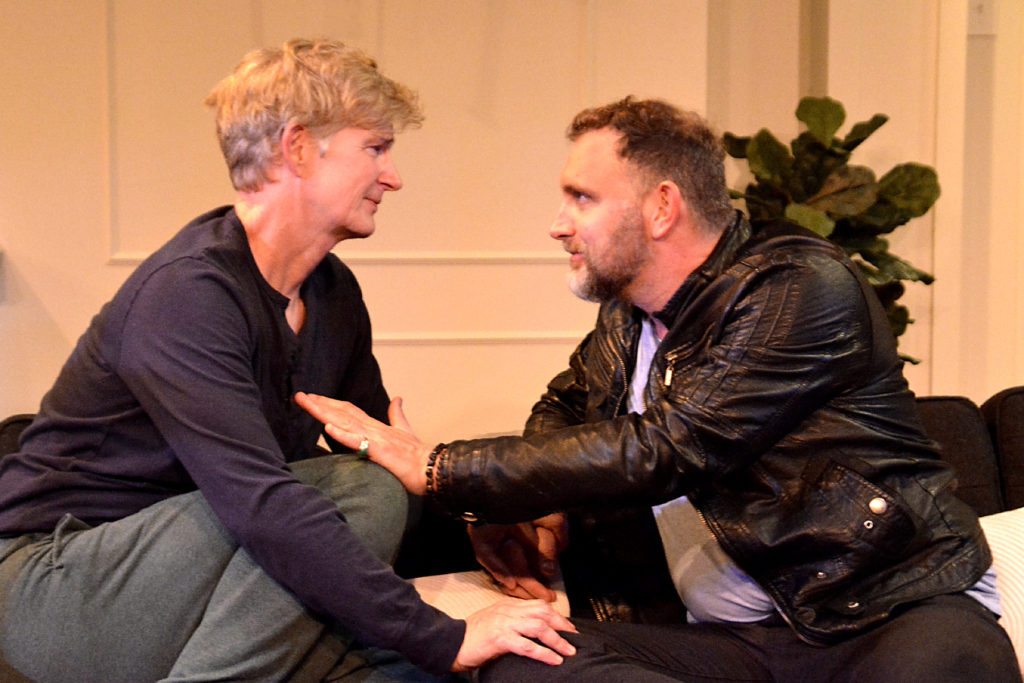THE PLAY THAT GOT AWAY
I don’t know the exact play Michael McKeever was writing prior to the 2015 Supreme Court ruling in favor of federal marriage equality, but I suspect it worked much more than this now locked-in reconstruction that made its way to Off-Broadway by 2018, and is now getting its Southern California premiere at The Fountain Theatre in Los Angeles under the direction of Simon Levy.
Daniel’s Husband is a play that questions Juliet’s famous assertion: “What’s in a name? That which we call a rose, by any other name would smell as sweet.” In regards to love, commitment, and binding relationships, do the names “husband,” “lover,” “partner,” or “boyfriend” emit the same sweet fragrance?
Meet architect Daniel (Bill Brochtrup) and writer Mitchell (Tim Cummings), a gay couple who’ve been together seven years. (I’ll get to the itch later). Mirroring a heteronormative life together, they’re as banal as any straight couple — except for that whole gay thing. When the play opens, we find the men hosting a dinner party for their friend Barry (Ed F. Martin), who’s also Mitchell’s agent, and his new flavor-of-the-month boy toy, Trip (Jose Fernando), a much younger man (as is typical for the relationship-skittish Barry), who’s as charming as he is clueless about the Judy Garland era. As the conversation shifts away from silly word games during post-dinner drinks, the topic of marriage gets explored.
The itch: Daniel wants it. Mitchell doesn’t.
That’s an understatement. Daniel wants it more than anything. Mitchell rains fire and fury over the party, objecting against such an archaic, money-sucking institution steeped in religion. And while Barry keeps mostly quiet, Trip suggests since gays can marry their same-sex partners, they should; it’s their responsibility. Mitchell isn’t having it, Daniel isn’t having his partner’s bullish outbursts, and soon the party ends.
Daniel’s Husband is a “problem play,” one which explores the social issues of the day — in this case, marriage in modern society. But it becomes problematic when the world changes more than the writing. Before the SCOTUS decision, gay couples were the victims in an us-against-the-world situation, demanding the same respect, acceptance, and rights society lavishly bestowed upon opposite-sex spouses. After the SCOTUS decision, things were different.
Where Daniel’s Husband falters in a post-Obergefell v. Hodges world is in creating a dynamic that — instead of pitting a modern gay couple against the world (which, thanks to that ruling, was no longer as relevant) — pits them against each other in a way that feels overblown and contrived for dramatic impact. While differing views on the institution of marriage are perfectly understandable (especially from gays of older generations who’ve come to enjoy the lives they were forced to lead outside the confines of social expectations), Mitchell’s objections are nonsensically severe.
When Daniel’s mother Lydia (Jenny O’Hara) arrives for a visit, things take a turn for the better — for the audience, that is — but not for Daniel, who’s already regretting every solitary second he has to spend with a woman he sees as overbearing and controlling; the woman he blames for sucking the soul out of his beloved late father, a talented coulda-been-big-time painter whom he honors by placing one of his arguably “angrier” works smack-dab in the center of his living room.
Lydia is a laughfest, spouting lines like “Lesbians love chicken!” with absolute certainty. She loves her gay son. And she adores his partner, Mitchell. According to her, it was she who saved Daniel from his homophobic father. And it was she who has continued to support him to this day. It’s also revealed her life as a widow is incredibly lonely, her days filled with meaningless events simply to pass the time — a pathetic state of existence.
And then, as fast as a Supreme Court ruling, everything changes in that beautiful home. An extreme situation devolves into a predictable Lifetime movie, allowing the playwright to teach us the lesson he’s had up his sleeve the entire time. Still, even when we can see where the play’s going, getting swept up in its emotion is easy. And despite its polemics and forced means of delivery, it excels in getting us to reconsider our individual perspectives and prejudices.
Brochtrup brings an endearing sweetness to marriage-pining Daniel, though at times his flirtations read more like a daze, as if he’s crashing from a sugar rush. When he’s fighting with his partner or mother, he comes most alive. Cummings is at his best when the material calls for passion and emotional depth, but he flails when he affects his voice (like Count Dracula and other bizarre choices) and acts cutesy, as if strange quirks equate to a more fully-developed character and relational intimacy.
It should be noted that Brochtrup and Cummings also played opposite each other in the same theater back in 2013, once again as a gay couple in The Normal Heart. Cummings played Ned Weeks, closely based on real-life playwright and gay AIDS activist Larry Kramer. This time around Cummings unfortunately channels too much “Kramer anger” from the get-go, his over-the-top rejections to marriage making him a rather unsavory jerk and partner, instead of a likeable man with differing views. That said, part of this is dictated by the play itself which calls for fiery exchanges between the couple over marriage, a subject that appears to be ripping them apart in their mutual reluctance to budge.
Martin succeeds in playing Mitchell’s best friend and agent Barry with a good-natured temperament, whether displaying the character’s Peter Pan superficiality or his in-your-corner tenderness. Fernando’s Trip works best in his gentle-loving kindness and earnestness, though his ditziness is overplayed. (It doesn’t help that his naïveté is also overwritten.)
The evening belongs to Jenny O’Hara who delivers one mother of a performance as Lydia. She gives us a complex woman who isn’t all that she seems or rumored to be ’” or is she? Lydia is certainly McKeever’s most layered role in the bunch. And O’Hara is an absolute powerhouse in her portrayal, channeling in humor, love, and desperation in spades.
DeAnne Millais’s set design, lit beautifully by Jennifer Edwards, is exquisite. Upon entering the theater we’re immediately immersed in what appears to be a refurbished 1960s Cape Cod-style living room (as only Daniel — detailed architect and designer that he is — can imagine it). It’s a beautiful setting for a home that has seen, and will continue to see, its fair share of memories — from raptures to ruptures. Wisely missing is Daniel’s father’s giant Hans Hofmann-esque expressionistic painting that hangs on the “fourth wall,” allowing the audience to intimately see how each actor responds to it over the course of the play — which can prove downright devastating.
Peter Bayne’s sound design is incredibly effective in its emotional wallops, a perfectly selected song bearing particular weight. Michael Mullen’s costuming is subtle and character-appropriate.
Daniel’s Husband comes down the pike after a long line of gay-centric plays highlighting the social issues of the day, notably The Boys in the Band, Angels in America, and The Laramie Project. Often these plays illuminate relatable universal themes just as much as they depict gay life specifically. That Daniel’s Husband straddled a significant shift in civil rights while it evolved as a work makes its social outcries against injustice less significant. However, its cautionary message, despite its improbable conceits, is undeniably relevant and universal. Assured is its propensity to move hearts and inspire discussions after the great beginning has seen the final inning.
photos by Ed Krieger
Daniel’s Husband
Fountain Theatre, 5060 Fountain Ave.
Fri, Sat & Mon at 8; Sat & Sun at 2
ends on June 23, 2019 EXTENDED to July 28, 2019
for tickets, call 323.663.1525 or visit Fountain Theatre









